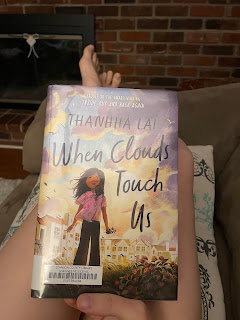Episode 69: A Compass for Deep Heaven: Navigating the C.S. Lewis Ransom Trilogy
On this week's dose of book recommendations, library love and literary enthusiasm, our guests Daniel Friend and Daniel Hsieh are here to talk about A Compass for Deep Heaven: Navigating the C.S. Lewis Ransom Trilogy. They are two of ten contributors to this brand new book, edited by Dr. Diana Pavlac Glyer and Julianne Johnson. My sister, Rachel Roller, is also a contributor, which is how I got connected with this fascinating project. Written to be accessible and useful to fans and scholars alike, A Compass for Deep Heaven provides the background information, historical context, and literary insight readers need to navigate the cosmos of Lewis’s science fiction. It does not merely inform; it shows how these contexts clarify key messages and reveal the real-world warnings hidden there.
Purchase a copy today, or find out more about at CSLewisCompass.com and on Facebook and Twitter.
Books from today's episode are on the Library Laura storefront on bookshop.org
Follow the Library Laura Podcast on Instagram, Facebook, Twitter, and on the Podcast Blog.
Last year I interviewed my sister Rachel on episode 8 and episode 9 of the podcast. One of the things we talked about was the work she did with her Honors Colloquy on a book of essays about the C.S. Lewis Ransom Trilogy. A lot has happened since then! Now that project, originally known as Warnings from Outer Space, has been traditionally published under a new title - A Compass for Deep Heaven: Navigating the C.S. Lewis Ransom Trilogy. I’m so very excited about all of this, and happy to be talking with two of the other contributors to that book today.
Daniel Friend lives in Austin, TX and is a reporter at The Texan. He studied Political Science at Azusa Pacific University and is the author of the chapter entitled The Cosmic Way, which examines Natural Law in the trilogy.
Daniel Hsieh lives in Pasadena, CA and just finished up his Masters degree in English from Azusa Pacific University, during which he wrote his thesis focused on C.S. Lewis' work as well. He wrote chapters on Arthurian Legend in Deep Heaven and Ransoming Logres.
It was really interesting to talk to our guests today about how this book went from being a Honors College assignment and graduation requirement, to a manuscript that should be published. Their Oxbridge tutorial professor and mentor, Dr. Diana Pavlac Glyer, played a large role in this. Early on in their study of the Trilogy, she helped them see that there was an opportunity to stand in a gap that existed -- there really wasn't a book out there designed to help readers navigate the fascinating and mystifying elements that Lewis wove into the Ransom Trilogy! She further encouraged them from the beginning to approach their work as a cohesive single unit -- a book-- rather than simply a collection of essays around a common theme.
So they brainstormed what they wished they would have known before reading the Ransom Trilogy, and elements they found confusing, and soon had a list of chapters and research topics on which to spend the rest of their year together as the Cosmic Colloquy, diving into all the depth and richness that Lewis wove together in this sci-fi work.
After they put together the original book, which was published by Azusa Pacific University Honors College, Julianne Johnson really took up the baton and led the way toward seeing the work traditionally published, and the work has since undergone several rounds of revisions and fine-tuning.
We discussed how Lewis is a fascinating scholar and author to study, because his works are numerous and extremely diverse. For example:
- The Chronicles of Narnia -children's fiction
- Mere Christianity - apologetics
- 'Til We Have Faces - adult fiction, a retelling of the myth of Cupid and Psyche
- Screwtape Letters - religious satire
- And then, of course he wrote the Space Trilogy or Ransom Trilogy, which includes Out of the Silent Planet, Perelandra, and That Hideous Strength.
Daniel Hsieh's chapters look at the four main Arthurian elements that show up in That Hideous Strength, including Merlin himself, the mandle of Pendragon / Fisher King, the concept of Logres, and the hope of Avalon. He then compares and contrasts the Fall as a breaking of relationship between God, others, nature, and self, and examines the opportunities for redemption and restoration of each of those throughout the story.
Daniel Friend focused much of his inquiry based on this quote from the preface of That Hideous Strength. which says that this modern fairytale for grown-ups, "Is a 'tall story' about devilry, though it has behind it a serious 'point' which I have tried to make in my Abolition of Man" (THS, 7). Friend enjoyed finding the parallels in big ideas and philosophy between That Hideous Strength. and the Abolition of Man and loved how Lewis uses storytelling to flesh out in fiction the ideas that he began in his lectures.
I asked what both had learned about C.S. Lewis and the Ransom Trilogy as a result of working on this project, and I really love their answers.
Daniel Friend explained that he enjoyed learning about the wager between Lewis and Tolkien and their goal to write more quality sci-fi and fantasy because "there was too little of what we like in stories" and so they decided to fill that gap. You can read more about this in Chapter 1, written by S.L. Jensen.
Daniel Hsieh reflected on the extent to which Lewis was stepped in literature and was extremely well-read. He said that even in all his English studies he still feels like he's only scratched the surface. He is blown away by how one human mind could be so saturated with literature from so many different areas and all different genres.
I asked them both about their favorite book of the Ransom Trilogy, which they both found (understandably) challenging to answer. Daniel Friend described Out of the Silent Planet as being one he would enjoy re-reading, but that That Hideous Strength held more depth for him. Daniel Hsieh spoke of how immediately stunning Perelandra is, but that ultimately That Hideous Strength. has been more impactful for him. He compared it to a delayed reaction, like a seed being planted, germinating, and slowly filling his mind upon further reflection.
Daniel Friend closed our conversation with his favorite quote from C.S. Lewis, found in Mere Christianity: "It is after you have realized that there is a real Moral Law, and a Power behind the law, and that you have broken that law and put yourself wrong with that Power—it is after all this, and not a moment sooner, that Christianity begins to talk."
| The Library of Congress |
Meanwhile, Daniel Hsieh mentioned the Last Bookstore in LA. He then told another story of the amazing home library of his former piano teacher, whose classical nature really served as an inspiration to him. He compared her to the Fox in That Hideous Strength or to Dr. Cornelius in Prince Caspian.
| The Last Bookstore, Los Angeles, CA |
Favorite books, currently reading, and currently writing
Other books mentioned
Anna Karenina by Leo Tolstoy - another section of the Honors College spent their year working on a book about Anna Karenina, which Daniel Friend almost ended up in. (We're glad he chose C.S. Lewis!)
Geoffrey of Monmouth's Life of Merlin - Daniel Hsieh mentioned Monmouth when discussing Merlin and how he was incorporated into That Hideous Strength
Deeper Heaven: A Reader’s Guide to C. S. Lewis’s Ransom Trilogy - another recently published book in the same vein as A Compass for Deep Heaven -- evidence of the gap in the market that's now being filled.
With lots of literary love from my library to yours!
~ Laura




























Comments
Post a Comment